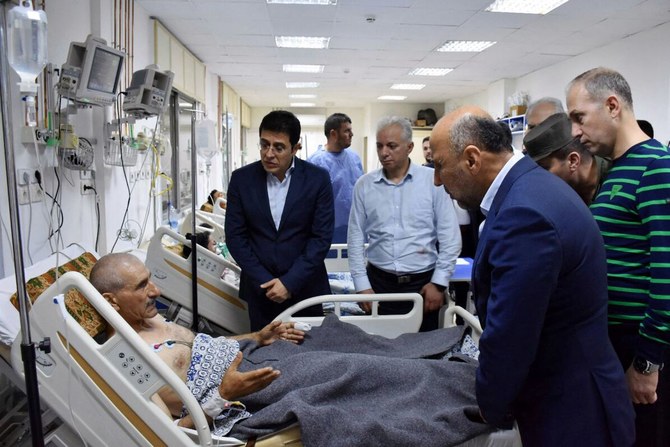JEDDAH: More than 100 people were killed on Thursday when armed drones struck a military academy in Homs province in central Syria during a graduation ceremony.
Separately, Turkish air raids in the country’s Kurdish-held northeast killed at least 11 people, according to Kurdish forces, after Ankara had threatened retaliation for a bomb attack.
Assad regime Defense Minister Ali Mahmoud Abbas had left the ceremony minutes before the attack, security sources said. The ministry said both civilians and military personnel were among the dead.
“After the ceremony, people went down to the courtyard and the explosives hit. We don’t know where it came from, and corpses littered the ground,” said a man who had helped set up decorations at the academy for the occasion.
Video footage posted online showed victims, some in military fatigues and others in civilian clothes, lying in pools of blood in a large courtyard. Some of the bodies were smouldering and others were still on fire. Amid the screaming, someone shouts: “Put him out,” with the sound of gunfire in the background. The Syrian military said some of the wounded were in critical condition, including women and children.
The military said insurgents “backed by known international forces” had carried out the attack, but did not name a specific group. It said it would “respond with full force and decisiveness to these terrorist organizations, wherever they exist.”
The Syrian Observatory for Human Rights, a Britain-based monitor, reported “112 dead including 21 civilians, 11 of them women and girls.” It said at least 120 people were wounded.
Health Minister Hassan Al-Ghobash told state television the “preliminary” toll was 80 dead “including six women and six children” and around 240 wounded. There was no immediate claim of responsibility.
The attack was carried out with “explosive-laden drones,” according to the military statement, vowing to “respond with full force.” The government declared three days of mourning starting Friday.
In the rebel-held Idlib region, residents reported heavy bombardment by government forces in apparent retaliation. The Observatory said eight people had been killed and some 30 wounded.
Swathes of Idlib province are controlled by Hayat Tahrir Al-Sham, led by Al-Qaeda’s former Syria branch. The jihadist group has used drones to attack government-held areas in the past.
United Nations chief Antonio Guterres was “deeply concerned” over the drone attack and the retaliatory shelling, his spokesman Stephane Dujarric said.
Geir Pedersen, the UN special envoy for Syria, said in a statement: “Today’s horrific scenes are a reminder of the need to immediately de-escalate violence, toward a nationwide cease-fire and a cooperative approach to countering Security Council-listed terrorist groups.”
Overnight, Syrian shelling killed an elderly woman and four of her children in a rebel-held area of Aleppo province, rescue workers and the Observatory said.
The government in Damascus said a three-day period of official mourning would begin on Friday.
Elsewhere in Syria on Thursday, Turkiye carried out its threat to target US-backed Kurdish militant positions in the northeast after a PKK suicide bomb attack in Ankara last weekend.
Turkiye’s defense ministry said in a statement Thursday evening that Ankara forces had carried out air strikes in northern Syria, destroying 30 targets, including “shelters, depots and storage sites.”\
The Kurds’ internal security forces said Turkiye had carried out 21 strikes in the area, killing “11 people, including five civilians and six” security personnel.Pentagon spokesman Pat Ryder told reporters that US F-16 warplanes over Syria had shot down a Turkish drone on Thursday, deeming it “a potential threat” after it approached “less than a half kilometer from US forces” near Hasakah.
Turkiye has carried out repeated strikes on targets in Syria’s Kurdish-held northeast.
On Wednesday, Ankara warned it would step up its cross-border air raids, after concluding that militants who staged a weekend attack in the Turkish capital had come from Syria.
The US-backed Syrian Democratic Forces led the battle that dislodged Daesh group fighters from their last scraps of territory in Syria in 2019.
Turkiye views the Kurdish People’s Protection Units (YPG) that dominate the SDF as an offshoot of the Kurdistan Workers’ Party (PKK), listed as a terror group by Ankara and its Western allies.
Turkiye has launched strikes on PKK positions in northern Iraq since Sunday’s attack in Ankara, which wounded two Turkish security officers and was claimed by the Kurdish group.
AFP correspondents in northeastern Syria saw smoke rising from oil sites near Qahtaniyeh, close to the Turkish border.
Two power stations in the area were also hit, as well as the vicinity of a dam.
Farhad Shami, spokesman for the SDF, the Kurds’ de facto army, said the strikes had targeted military and civilian sites.
“There has been a clear escalation since the Turkish threats,” he said.
In the market of the city of Qamishli in Hasakah province, vendors voiced concern.
“The situation is worsening every day. Turkiye doesn’t let us breathe,” said Hassan Al-Ahmad, a 35-year-old fabric merchant.
SDF commander Mazloum Abdi denied Wednesday that the Ankara assailants had “passed through our region.”
“Turkiye is looking for pretexts to legitimize its ongoing attacks on our region,” he said.
The Kurdish administration urged “the international community” to “take a stand capable of dissuading” Turkiye from its attacks.
The United States, Russia and Turkiye all have troops in the country.
Between 2016 and 2019, Turkiye carried out three major operations in northern Syria against Kurdish forces.
The conflict in Syria has killed more than half a million people since it began in 2011 with a brutal crackdown on anti-government protests, spiralling into a devastating war involving foreign armies, militias and jihadists.
(With AFP)






















